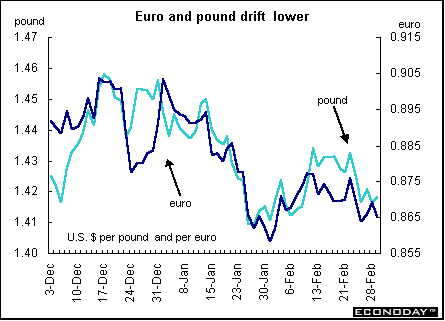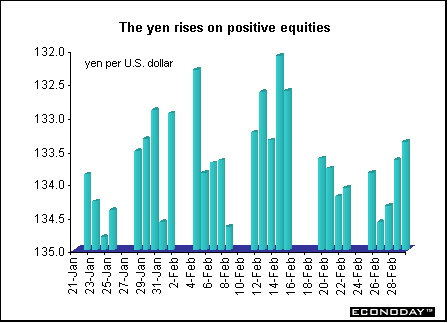
Currencies
The euro fell last week against the dollar for the first week in four after stronger than expected growth and manufacturing reports bolstered optimism that the United States is recovering from recession. The euro slipped 1.2 percent on the week. Sterling extended its decline against the dollar this year to 2.4 percent after Bank of England Governor Eddie George said a drop in the value of the currency would help the British economy. Another monetary policy committee member underlined George's comments by saying that a fall in sterling from current levels would help even out the imbalance in the economy between services and manufacturing.

Although the yen gained marginally last week, analysts remain cautious especially ahead of March 31. Missing of late has been the usual Japanese official rhetoric about the weak yen, which had led to yen weakening. Further repatriation by exporters ahead of fiscal year-end remains likely even though it is not clear whether this demand will be enough to limit further yen weakness should new yen sellers emerge. Analysts also are skeptical about the short-covering jump in the Nikkei triggered by new regulations. Demand for equities boosts demand for the yen.

The U.S. dollar has risen against both the euro and the yen on speculation the United States would pull out of recession before Europe or Japan. Good U.S. economic numbers such as those last week are supportive for the dollar. The three largest economies that share the euro - Germany, France and Italy - contracted in the fourth quarter, while recent reports show that Japan remains mired in its third recession in a decade.
Foreign investors poured more money into U.S. financial assets last year than in each of the previous two years according to the U.S. Treasury. That helped push the dollar up against the euro and the yen during the last five months of the 2001. There has been a huge influx of foreign capital into the U.S. markets, both into Treasuries and stocks. But gains for the dollar against the yen could be limited in coming days as Japanese corporations are likely to bring overseas profits home before their fiscal year ends on March 31.


Last Week's Highlights • Global Stock Market Indexes • Recap of Global Markets • Currencies • Indicator Scoreboard

The Bottom Line • Looking Ahead
|